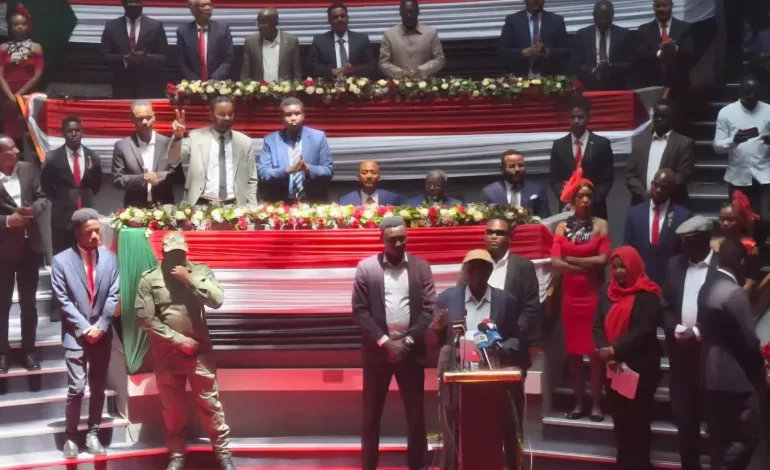Parallel Government… Expanding Rejection and Condemnation

Sudan Events – Agencies
Rejection of the founding charter of the Rapid Support Forces (RSF) militia and its allies from political movements and organizations, signed in Nairobi, continues to grow. Meanwhile, the Sudanese public strongly opposes any foreign intervention in the country’s internal affairs. The charter has not found acceptance, while pressure mounts on Kenya and its president, who supports a militia rebelling against the Sudanese government.
Deepening Division
Former Egyptian Assistant Foreign Minister, Ambassador Salah Halima, described the signing of a political charter between the militia and its allies in Kenya as a misguided and incorrect step that deepens divisions, threatens Sudan’s unity and territorial integrity, and opens the door for foreign interventions that do not align with the country’s interests.
Speaking to Sudanese Echoes, Halima stated that this move contradicts a well-established popular stance against military groups having civilian political allies and vice versa.
Stillborn Initiative
Halima further asserted that this initiative was “stillborn,” as its attempt to gain recognition for a future government will not be accepted in the face of regional and international recognition of the current Sudanese government. He pointed out that the new alliance includes the RSF, which has been internationally condemned for committing war crimes and crimes against humanity, with its leadership under sanctions. Moreover, the militia is facing a series of defeats, losing control over many areas it previously held.
The Charter’s Content
Halima emphasized that the political charter’s contents should be discussed within a broader societal dialogue alongside other perspectives on a permanent constitution being drafted by a specialized committee. This process should follow the legal and customary methods for constitutional drafting. Therefore, it is not suitable for a political alliance involving militias with questionable legitimacy, as they seem to be attempting to establish a parallel government—an endeavor unlikely to succeed given their limited popular support.
A Poorly Executed Play
Former Sudanese Minister of Information and Democratic Unionist Party leader Dr. Ahmed Bilal Osman dismissed the Nairobi event as mere theatrics. Speaking to Sudanese Echoes, he described the signed charter as “ink on paper” and a “poorly executed play,” stating that it was nothing more than media hype that quickly faded.
The Evil State
Meanwhile, Bahr Idris Abu Garda stated that the RSF militia has failed to achieve any military progress. After suffering severe defeats, it is now attempting to find an escape route. He accused the militia of being a tool used by “the evil state” and foreign powers seeking to recolonize Sudan.
Abu Garda argued that the militia is incapable of political action, particularly after the failure of the Framework Agreement. He also accused the Kenyan president of supporting the RSF after being “bought” and facing significant internal pressure to form a parallel government. However, he noted contradictions in this alliance, as the RSF has no real alignment with the goals of the Sudan People’s Liberation Movement (SPLM), which once advocated for fair rights but has since revealed itself as opportunistic by aligning with the militia responsible for killing people in Kordofan.
Despite this, Abdelaziz al-Hilu continues to align with the RSF, a stance Abu Garda described as opportunistic and unsustainable. He also claimed that the UAE is divided on this issue—one faction openly supports the militia and its so-called government, while another, calling itself “Sumood” (Resilience), follows a different approach. However, he insisted that the UAE is orchestrating the entire process, describing it as a “deceptive play” with hidden hands creating such entities.
Abu Garda concluded that the Nairobi event was a desperate attempt by the militia to stay relevant after its battlefield failures, highlighting that Sudan’s army has achieved decisive victories, rendering the RSF’s military presence ineffective. He warned that this political maneuvering is merely an attempt to shift the battle to a different arena after their military defeat.
Source: Sudanese Echoes



